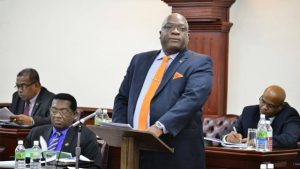 The Team Unity Government, led by Prime Minister Dr. the Honourable Timothy Harris, is fulfilling yet another manifesto promise made to the people of St. Kitts and Nevis, as it relates to accountability and the good governance agenda.
The Team Unity Government, led by Prime Minister Dr. the Honourable Timothy Harris, is fulfilling yet another manifesto promise made to the people of St. Kitts and Nevis, as it relates to accountability and the good governance agenda.
The tripartite coalition government has brought the Public Accounts Committee Bill 2017 to the National House of Assembly today, Thursday, August 10, 2017 for its second reading and subsequent debate. The Bill had its first reading on July 11, 2017.
The Public Accounts Committee Bill 2017 seeks to bring into being and set the legal framework for the functioning of the Public Accounts Committee that will provide oversight on public expenditure in particular.
Prime Minister Harris said that the establishment of a functioning Public Accounts Committee essentially opens up the Government to public scrutiny, as his administration does not “intend to hide the public business from the people.”
“We are here today, unlike the rejected administration, opening up the country to an unprecedented level of accountability and scrutiny not because it is expedient but because we genuinely believe that it is the right thing to do. The people must trust their government to do the right thing every time and not just when it is convenient,” Dr. Harris stated, adding that only in matters of high national security where the public interest would be better served should information not be freely given.
Prime Minister Harris, who is also the Minister of Finance, stressed that while there have been at least three Public Accounts Committees formed in St. Kitts and Nevis since the Federal Elections in the year 2000, there are no records of those committees ever functioning.
This, according to the honourable prime minister, led to St. Kitts and Nevis being viewed in a negative light by international agencies.
“The last administration would have had the benefit of the Public Expenditure and Financial Accountability (PEFA) assessment framework going back from 2010 year after year, as part of an intervention from the European Union, particularly in the post sugar era, in which they attempted to say ‘how can we help bring into the sunshine of public accountability the activities of the government’ and every year they received, if you will, a failing grade with respect to the public accountability function of the government and nothing had been done. So we have come now Mr. Speaker to do what is needed and to ensure that the Public Accounts Committee can act as a watchdog of sorts to the Parliament, providing oversight on public expenditure,” Dr. Harris stated.
The Public Accounts Committee will comprise of five members, three coming from the Government side and two from the Opposition benches, with the Leader of the Opposition designated as the Chairman of that committee.
The Standing Orders of Parliament state that the duties and powers of the Public Accounts Committee are, among other things, to ascertain that the authorised expenditure during each financial year, including supplementary expenditure, has been applied to the purposes prescribed by the National Assembly and to scrutinise the causes which may have led to any excess over authorised expenditure and to verify applications of savings on other authorised items of expenditure.
